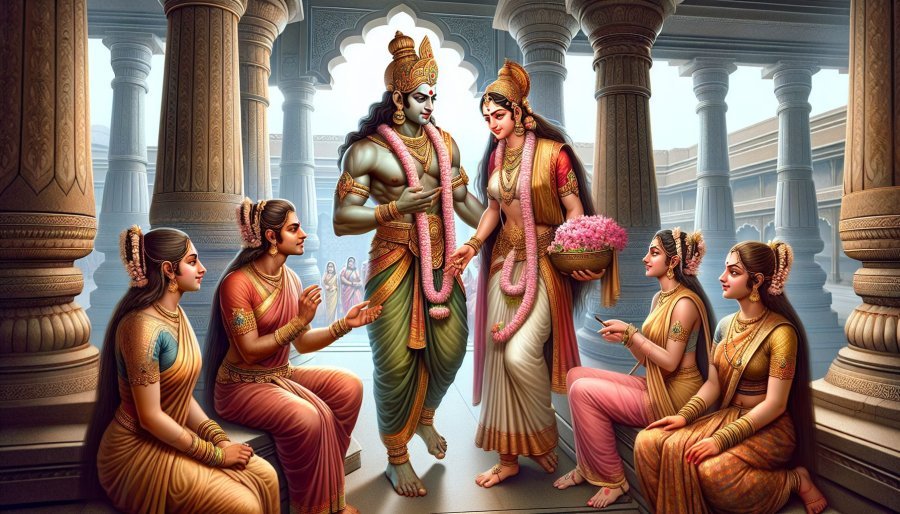Section LXXXI - Yayati Marries Devayani: Story from the Mahabharata
Book index: Mahabharata (English)
This page contains a summary of the Mahabharata Section LXXXI including examples of moral lessons in daily life. The Maha-Bharata is one of the largest epics ever written containing roughly 100,000 Sanskrit verses. It deals with the legendary history of ancient India and contains a large number of interwoven tales.

Short summary of the chapter:
Devayani, the daughter of Sukra, and Sarmishtha, the daughter of the Asura king Vrishaparvan, were wandering in the woods with their maidens when they encountered King Yayati, who was tired and thirsty. Yayati inquired about their identities and was captivated by Devayani's beauty. Devayani revealed her lineage and declared her wish to marry Yayati, who initially hesitated due to their different social statuses.
Despite Yayati's reservations, Devayani insisted on marrying him and sent a maid to inform her father, Sukra. Sukra agreed to the marriage and absolved Yayati of the sin of begetting a half-breed. Yayati then married Devayani and was also granted Sarmishtha as a companion but instructed not to summon her to his bed. The marriage was conducted according to scriptures, and Yayati returned to his capital with his new wives and maidens, blessed by Sukra and the Asuras.
Full English translation:
This page is merely a summary which is automatically generated. If you are looking for authentic sources such as the Sanskrit text or the Full English translation of Mahabharata Section LXXXI - Yayati Marries Devayani: Story from the Mahabharata, have a look at the following articles:
Section LXXXI, online text
English translation by Kisari Mohan Ganguli.
Read this and other chapters online.
Mahabharata (English Summary)
by Kisari Mohan Ganguli | ISBN-10: 8121505933
Buy the latest edition:
FAQ of Mahabharata, Section LXXXI:
Marriage of Yayati and Devayani
- What did Devayani ask Yayati after introducing herself? Devayani asked Yayati to marry her. - Why did Yayati hesitate to marry Devayani at first? Yayati hesitated due to the differences in their social status. - How did Yayati ultimately agree to marry Devayani? Yayati agreed after Devayani's father, Sukra, bestowed her upon him. - What condition did Sukra place on Yayati before marrying Devayani? Sukra asked Yayati to not summon Sarmishtha, Devayani's maid, to his bed.
Daily life: Yayati Marries Devayani: Story from the Mahabharata:
The narrative of Yayati, Devayani, and Sarmishtha encapsulates timeless teachings that can be integrated into daily life, especially regarding relationships, decision-making, and respecting societal norms. The story beautifully demonstrates the complex nature of relationships, showing how bonds between individuals can evolve over time due to fate and personal choices. For example, Devayani and Sarmishtha, despite their contrasting backgrounds, find themselves entangled in a situation that ultimately leads to an unexpected union between Devayani and Yayati, highlighting the idea that our connections with others can take unforeseen paths, influenced by various factors outside our control.
The dialogue between Yayati and Devayani, where they exchange questions about each other's backgrounds and intentions, underscores the importance of communication and mutual respect in building and sustaining relationships. Yayati's initial hesitance to marry Devayani without her father's consent speaks to the value of abiding by societal and familial norms, as well as the significance of seeking blessings and approval in matters of the heart. This narrative teaches us that respecting traditions and cultural values can pave the way for harmonious relationships and societal acceptance.
Furthermore, Sukra's ultimate approval of the marriage, along with his condition regarding Sarmishtha, sheds light on the intricacies of compromise and the challenges of upholding personal and moral responsibilities within relationships. Yayati's acceptance of these conditions, and his willingness to respect Sukra's wishes, exemplify the necessity of compromise and understanding in maintaining healthy relationships. Therefore, this story encourages readers to approach relationships with a balance of heart and mind, acknowledging the roles of fate, responsibility, and compromise in shaping our connections with others.
